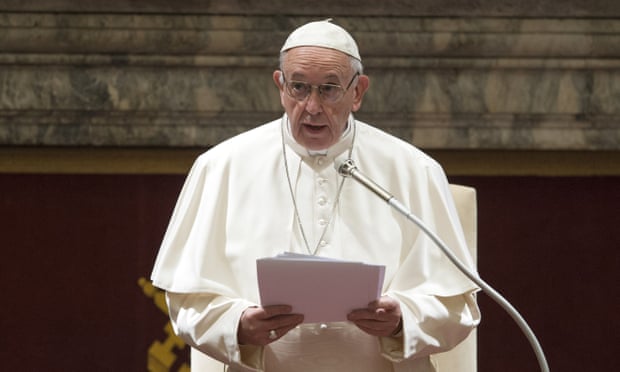The Guardian View on Catholic Abuse: Repent and Confess
The Guardian
Pope Francis gives an annual Christmas speech to his civil service in the Vatican and he wastes none of it on praising them. From his very first condemnation of their gossip, pride, and “spiritual Alzheimer’s” in 2014 he has found faults to pick with parts of the Roman Catholic church. This year, it was the turn of sexual abuse, a subject on which he has himself been squarely in the wrong before. As if making up for lost time, he gave one of the most ferocious denunciations of his own church’s past, and promised concrete measures and a new start. He even praised the journalists who brought these scandals to light, in the teeth of ecclesiastical denial and obstruction. He demanded that any priests guilty of abuse hand themselves over to the civil authorities, and prepare to face the justice of God as well. This is all excellent stuff and only about 20 years late. The great problem for the church this century has not been the exposure of contemporary abuse so much as the exposure of the cover-ups of past abusers. Francis himself has been accused by his enemies of protecting a notorious abuser, Theodore McCarrick, once a powerful figure in the US church, whom he sacked as a cardinal in the summer. In fact, Mr McCarrick was the beneficiary of a long-standing Vatican policy of promoting effective fundraisers, and owed most of his rise to the sainted John Paul II. But several US states have published lists of hundreds of men credibly suspected of historic offences, but protected by bishops in the past; Francis’s own order, the Jesuits, is to engage in a similar reckoning with its past. In Britain, the present head of the Catholic church, Cardinal Vincent Nichols, has apologised for his handling in 2003 of a case involving one of his priests, a son of the author JRR Tolkien. The cardinal had revealed to the police, but not to a victim’s family, that one of his predecessors had allowed John Tolkien to continue as a parish priest even after receiving reports of abuse. The pope has promised that “the church will never seek to hush up or not take seriously any case … that must never happen again”. It is difficult to judge whether such vehemence is a sign of strength or weakness. One thing is certain: although Pope Francis can change his mind, as he has done on the seriousness of the abuse crisis, he does not respond well to threats. His speech comes after a year in which his enemies, financed by American rightwing money, have tried to weaponise the abuse crisis against him. One former Vatican ambassador to Washington demanded publicly that he resign and was supported, more or less openly, by a powerful faction in the US church. Part of his speech appeared to be directed at such men, who are, he said, on their way to hell: “They hide behind good intentions in order to stab their brothers and sisters in the back … They always find … intellectual and spiritual excuses, to progress unperturbed on the path to perdition.” This ought to be more than simply ecclesiastical knockabout to the outside world. Although his more excitable opponents may imagine that Pope Francis is the antichrist, in the real world he is more the anti-Bannon: the world figure who stands most firmly against the vision of universal competition promoted by dictators everywhere. That some Vatican conservatives have opened their doors to Trumpian thinking represents a real threat that the pope has wisely sought to repudiate. His championship of the poor, of immigrants, of the tortured and the martyred all around the world remains a theme in all he does. He’s not infallible, but he makes a virtue of this fact. A pope who accepts the fallibility of his church as well as his office is one the world needs. As 2018 draws to a close…. … we’re asking readers to make an end of year or ongoing contribution in support of The Guardian’s independent journalism. Three years ago we set out to make The Guardian sustainable by deepening our relationship with our readers. The same technologies that connected us with a global audience had also shifted advertising revenues away from news publishers. We decided to seek an approach that would allow us to keep our journalism open and accessible to everyone, regardless of where they live or what they can afford. More than one million readers have now supported our independent, investigative journalism through contributions, membership or subscriptions, which has played such an important part in helping The Guardian overcome a perilous financial situation globally. We want to thank you for all of your support. But we have to maintain and build on that support for every year to come. Sustained support from our readers enables us to continue pursuing difficult stories in challenging times of political upheaval, when factual reporting has never been more critical. The Guardian is editorially independent – our journalism is free from commercial bias and not influenced by billionaire owners, politicians or shareholders. No one edits our editor. No one steers our opinion. This is important because it enables us to give a voice to those less heard, challenge the powerful and hold them to account. Readers’ support means we can continue bringing The Guardian’s independent journalism to the world.
|
.
Any original material on these pages is copyright © BishopAccountability.org 2004. Reproduce freely with attribution.
